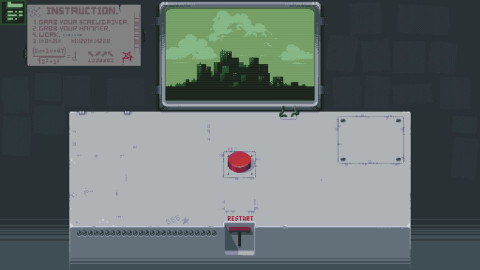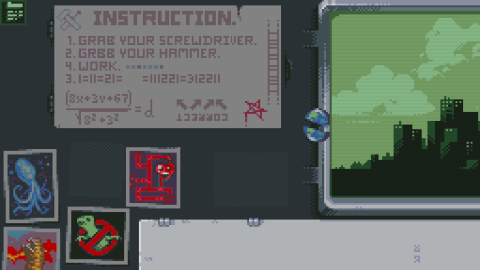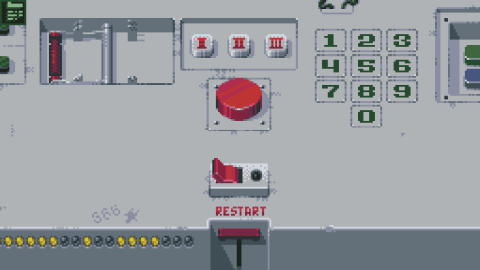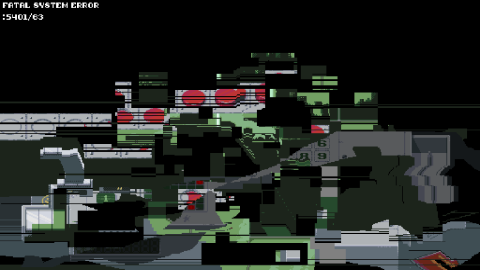Please, Don’t Touch Anything (PDTA) is a modern puzzle box; a complex set of riddles where to succeed, you will need to very much ignore the game’s title.
Price: $4.99/£3.99
Version: 1.0
Size: 48.3 MB
Developer: BulkyPix
Platform: iPhone & iPad
![]()
Left to your own devices in front of a massive control panel, a voice instructs you: “please, don’t touch anything.” You gaze at the world outside and wonder what kinds of chaos and destruction might be caused if you don’t do as you’re told. Of course, if you play by the rules the game’s going to be very short indeed, so inevitably curiosity takes hold and you press the tantalizing big red button.

Ooooh, what does this button do? Nothing could be more tempting.
Touching the button reveals another oh-so-tempting red switch, and flipping the switch does a thing too, though it’s more fun to find out what on your own. That sets the tone for how the game pans out. Cause and effect, trial and error, rinse and repeat. Your interactions variously cause extra buttons to appear, hidden drawers to pop out and secret codes to be revealed. Sometimes your decisions have even more serious repercussions. The seemingly simply desk console is in truth hiding dozens of micro-riddles and cryptic messages, just waiting to be solved.
It’s difficult to fully explain how PDTA works without spoiling it completely. There’s very little action – most of the “playing” takes place inside your head, as you stare perplexed at a convoluted instruction sheet, wondering what messages the bizarre and bewildering etchings are hiding. Prepare your brain to be well and truly teased.

This sheet of apparent nonsense actually contains about a dozen clues if you look hard enough.
There’s no real plot to speak of here, but 25 different “endings” are hidden throughout, dependent on how you react to the mysteries of the control panel. While some are simple (accidentally blowing up the world is much easier than we thought), others are painfully difficult, and the only real goal is to complete as many of them as you can. Many of the endings contain delightful pop culture references, as shown by the posters unlocked by finding them, and there’s a charmingly cruel wit behind each one.
However, the puzzles themselves are not always perfect. Many are exceedingly obtuse, with solutions kind of hidden in plain sight behind bizarre leaps of logic. There’s also a lot of repetition, having to follow some sequences again and again to re-unlock various parts of the console each run-through. None of these steps take more than a few seconds once you know what to do, though, and the repetition does at least help to build the sense that you’re really learning how the machine works.

Many of the ‘riddles’ involve finding hidden passcodes for various input panels.
Unlike many iOS puzzle games, PDTA offers little to no instruction, and certainly no hint system of any kind. (Apart from the many hints that make up the game itself.) If the frustration becomes unbearable there are of course several hint guides just a web search away, but we highly recommend conquering as much as you possibly can solo before resorting to online solutions. At the risk of sounding like an exasperated teacher, you’d only be cheating yourself!
It’s hard to recommend this game to those with short attention spans. Played out from a single scene, a desk and window is all you’ll see for (almost) the entirety of the game. Some App Store reviewers have vented their frustration at being charged $5 for something which – on the face of it – is so simple, while many others have applauded the complex and unforgiving nature of the puzzles. At its heart, this is a game about pushing buttons, but if you’re easily exasperated you’ll find that it pushes your buttons right back.
The retro art style is well suited to a game about precision – it’s apparent that almost every pixel counts. This is a tightly-packed game and everything is there for a reason. What little animation there is looks great and the unlockable posters are a cool touch. The atmospheric chiptune soundtrack is really nice too, ramping up in intensity as you reveal more and more of the machine.
Though not dissimilar from the impressive mystery puzzle series The Room, PDTA is almost a genre unto itself. It’s unique and satisfying, but it’s also frustratingly obtuse at times. And it is pricey – but if you’re up for the challenge then go right ahead and please, touch everything.
Please, Don’t Touch Anything by @BulkyPix is a modern puzzle box, and we touched everything: https://t.co/tuc8SFgg8Z pic.twitter.com/FMw8tcIkiY
— TapSmart (@TapSmart) October 27, 2015


